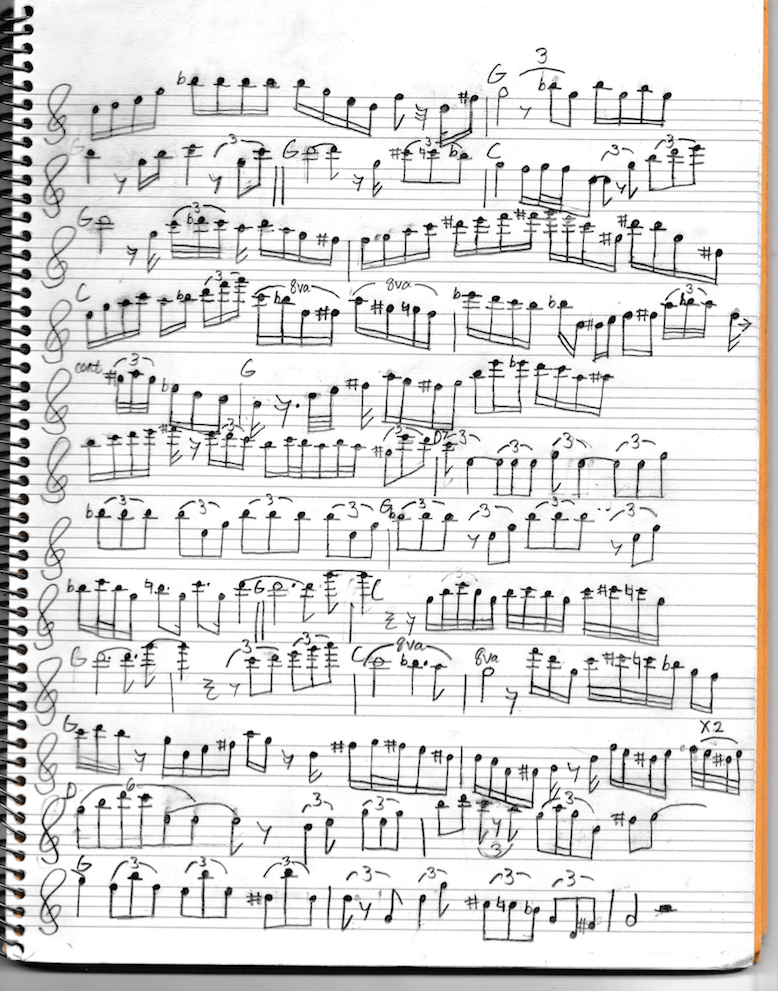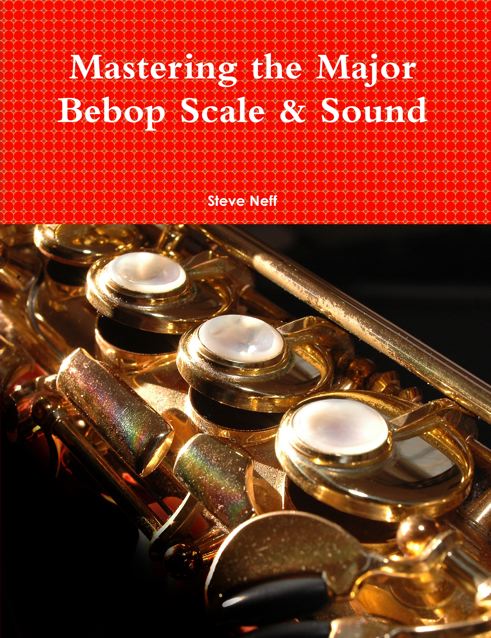Here is another killin’ transcription from a 10th grade student of mine here in Vermont, Jack Egan. About a month ago, I shared an incredibly hard transcription on the site that Jack had done on Vincent Herring’s solo on “All the Things You Are”. Around that time, I shared another recording with Jack of a Youtube clip of Tim Green tearing up a blues on alto sax. This clip was sitting in a folder on my desktop entitled “Transcription Cue”. That’s where I put all the amazing clips I find on the internet that I feel need to be transcribed someday. Anyways, Jack was digging this clip as much as I did so again I threw out the challenge, “You should figure it out for your next transcription.” “Ok” he replies nonchalantly………..
Last week, Jack told me he had finished the transcription (after telling me he had made All-State Jazz Band here in Vermont! Woohoo!) and then a few days later he emailed me the transcription. Upon looking at it, all I could think was “Wow! This was a lot harder than I thought.” Triplets, 16ths, 32nd notes, 32nd note triplets……..all mixed up and all over the place. Many of these rhythms were probably the first time Jack had encountered them. Nevertheless, Jack figured them out and finished the whole solo! Again, I say “Wow!” Great job Jack! Check it out:

Last Page of Tim Green’s Solo on Blue Monk from Jack’s Manuscript Book
Back to the solo, I first heard Tim Green in the 2008 Thelonious Monk Competition where he came in second place. I later purchased his 2013 recording “Songs from This Season” which I loved but haven’t checked him out more than that until randomly finding the Youtube clip below one day. He has my attention again that is for sure.
The title of this blog post states “Now THIS is how you solo on a blues!!” Tim is bringing it on this solo! For me, it’s a great example of soloing on a blues with jazz vocabulary but also feeling and emotion. During the solo you can hear people yelling and calling out almost like it is Gospel service. People are moved and can’t help but yell out! This solo isn’t just about technical acrobatics but about feelings and expression. It’s about the music coming out of the horn and moving the audience emotionally. I love it!
Tim does a masterful job combining so much classic bebop vocabulary with classic blues vocabulary. He balances the flashy lines with the emotional maturity that slows down and holds out a note because it should be held out. He slows down and repeats lines and ideas not to impress but to convey a feeling and build a story in his solo. Masterful!
I’ve been playing this solo for the last three days and absolutely love it. There is so much to gain from delving into it and learning from it. I hope you find it as rewarding as I have to listen to, play with and learn from. Great job to Tim Green for the fantastic solo and thanks again to Jack Egan for the transcription! If you want to check out more of Tim Green visit his website at www.timgreenmusic.com. I can’t wait to hear more from this great young player.
Tim Green Amazing Alto Saxophone Solo on Blue Monk
Blue Monk-Tim Green Alto Sax Solo Eb



Amazing solo! bravissimo Jack, Tim and you Steve 🙂 – now I am going to spend the whole weekend on that transcription….
“He slows down and repeats lines and ideas not to impress but to convey a feeling and build a story in his solo.”
This is a very perceptive comment as it reminded me of something I read a number of years ago in a Stan Getz biography. There was this story in the book about how when Lester Young and Sonny Stitt were traveling together in a bus while on tour in a band and Sonny Stitt was practicing some new licks and he turned to Lester Young and asked him what he thought of it. Lester Young replied that you need to tell a story. This subtle put down by Young made me chuckle because Stitt was very competitive, or so I’ve read, and of course Young was right because music is a language and if it’s a language then you should be conveying a story when you improvise whatever your approach may be. Something similar I read in a Parker biography was that when on the road in a band and they were at a bar or someplace like that and Parker was listening to some Country Western music. Someone asked Parker why he was listening to such corny fare and Parker replied that he liked it because it was telling a story. Sometimes when I hear players running through a bunch of licks that’s exactly what it sounds like to me. I’m playing this lick, now I’m playing this lick, and now I’m playing this lick, etc. so I don’t hear a story being told, just a bunch of licks. Then I fall asleep. And who’s going to argue with Lester Young and Charlie Parker?
I think what Lester said was, “Crazy man, but can you sing me a song?”
I agree with you Steve, and also with Rob.
Sometimes, when I feel a display of technique disjoint from “feeling”, necessary to tell a story, and to tell “ourselves”, what we feel and want to communicate, I begin to feel nothing, I get bored, however technically masterful it may be the musician.
Honestly, I don’t think this could be the case with the Sonny Stitt I know … he tells a lot and never bores me; as well as a great storyteller is Dexter Gordon, etc.
Tim Green, also using and combining some blues and bebop vocabulary, tells a lot, I like him because he plays what he feels, has a feeling and has so much to say that he wouldn’t even need to use licks … And I like what I perceive: his joy of playing what he feels; and that he feels so urgently that he starts playing before the other musicians start doing … and the enthusiasm to express the many things he feels and having to choose among the many things he feels … and the enthusiasm that, inevitably because he is sincere, he transmits to other musicians and to the public!
Bravo Tim!
And bravo Jack.
Giuseppe C.
Sorry, errata: with reference to my previous comment where I describe Dexter Gordon as a “storyteller” (term which I now realise is currently used by someone with negative meanings, such as those who tell lies), I wanted to specify that, perhaps due to my poor knowledge of English, I have used this term which, currently, could be misinterpreted in a negative sense, which I did not mean; I meant to say that Dexter Gordon, and other saxophonists, I like them so much precisely because, in addition to their technique, they have the gift of the feeling and, therefore, of telling a story when they play.
Giuseppe.
No worries Giuseppe. I think everyone gets what you are referring to with the word “storyteller”. I never thought of the negative meaning of this word at all because of the context that you put it in. It’s all good. Steve
Thanks Steve,
always kind.
Giuseppe.